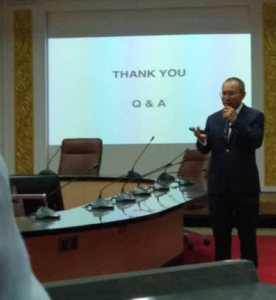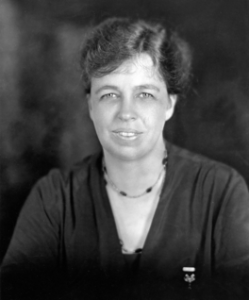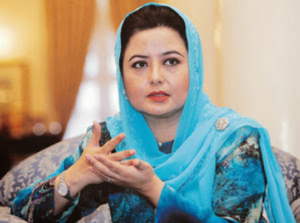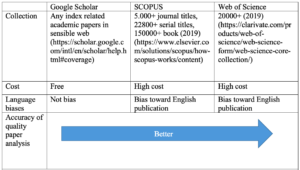Figure 1: Tan Sri Abdul Wahid Omar
Tan Sri Abdul Wahid Omar (Figure 1) is the ninth child from eleven siblings. Came from a poor family and originate from Johor Bahru. A very simple person yet humble and full of positive spirit. He started his talk on “Purposeful Leadership and Sustainability” at UTM on 31 July 2019 by simple introduction of him and short joke of “Kisah 3 Wahid Omar”. I am very sure; this is a trigger to attract the audience’s attention.
He began his talk by presenting his success stories. Started as an accountant, he later was appointed for three times to be a CEO of listed companies; United Engineer Malaysia Berhad (UEM), Telekom Malaysia (TM) and Maybank. The best thing is all these three companies had an increase of turnover under his management. During his talk on his experiences in turning over UEM, TM and Maybank, he highlighted few strategies on the management and leadership skills. One of the key point is transformation. It is important to change the management and transform the whole structure of the company by balancing the current staffs (inside staff) and new staffs (outside staff) by 70%-75% and 20%-25%. He also reminded the staffs to remove the bad working culture; for example, going out for drinking coffee at 10am and come back after 2 hours, then go out again for lunch. All these will reduce the productivity of the company. Talent review is also vital when he said he will choose someone with not only good in CGPA. He would prefer to employ a candidate with CGPA 3.5 from kampong rather than CGPA 4 from Damansara. He also mentioned that it is not good to have all the employee come from a same background; for example, 90% from the top management are from MRSM Seremban or most of the employee are ladies. Diversification of employees will give better results in the performance of a company.
Another key point is finding the main problem. From the problem, then only there will be a clear purpose what can be done next. After the identification of the problem, a strategy on prioritizing is important to improve the performance. All the assets and resources need to be restructured and focus on the profitable target and objective. Besides that, identifying and focusing on the customers need can simplify the structure. For example, Humanising Financial is one of his effort in providing people with convenient access to financing. Whereby in this business model, customers are advised based on their needs with fair term and pricing. This strategy showed positive impact when Maybank continued to extend its leadership as the number one bank in Malaysia. Tan Sri also believed that by putting Islamic financial as their first priority will lead to a better success. It is proven when Maybank Islamic grow faster and become the largest Islamic bank in Malaysia and fifth in the World.
There are three key words; integrity, competency and humanity that should be in line with every leader. In order to develop the talent for future success, young generation should be given the opportunity. From his perspective, 40 years old is an adequate age to be selected as a leader. As a new comer in the academia, he highlighted his concern on the intake of female students which are higher compared to the male students in the University level. This issue need to be encountered from the root so that we will not be lacking of future leaders.
He closed his talk by promoting “save the tiger” and urged us to do something for a better ecosystem. I can say that, I learned a lot from Tan Sri Abdul Wahid Omar session. He is a gifted person with talent and patience in contributing to our nation. He worked really hard and smart in order to achieve the success. And last but not least, he reminded us, don’t shy on saying sorry and thanks, be grateful to Allah for His blessings and to parents and partner too.



